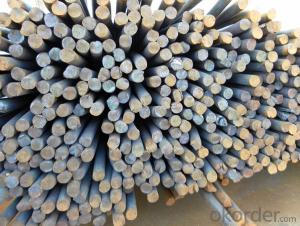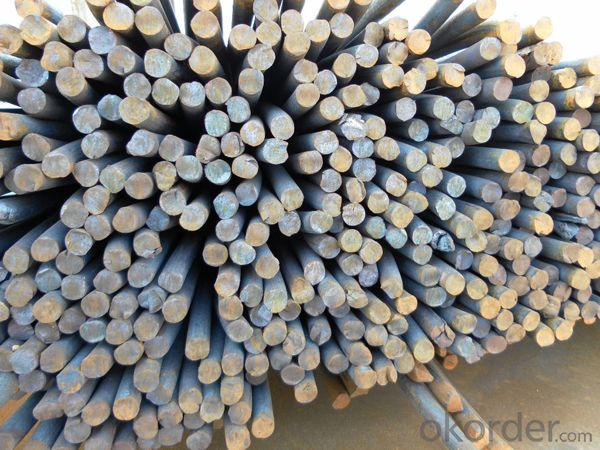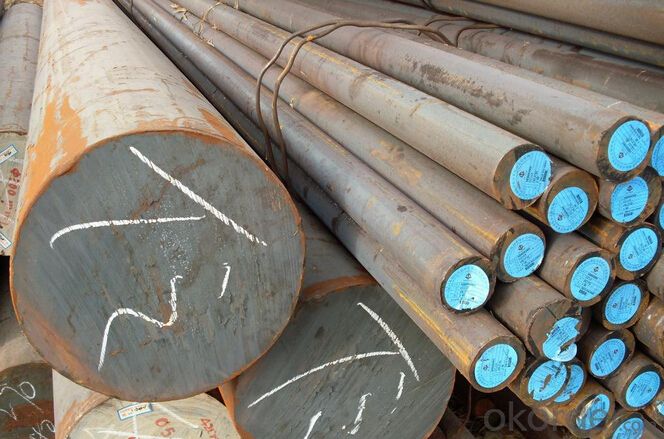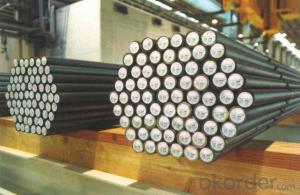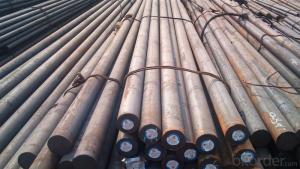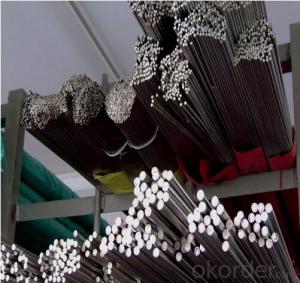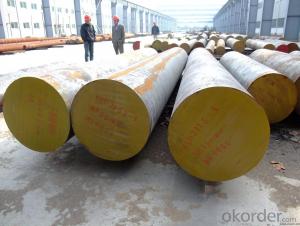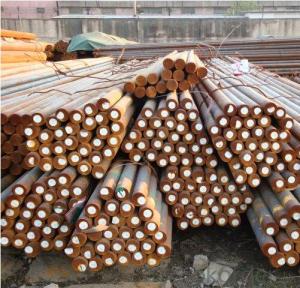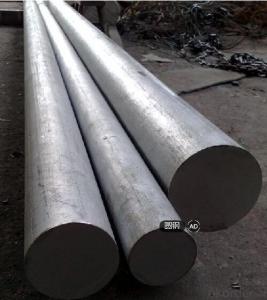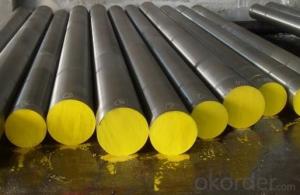Cr12MoV, SKD11, D2,D3, 1.2379 Round Bars
- Loading Port:
- China main port
- Payment Terms:
- TT OR LC
- Min Order Qty:
- 30 m.t.
- Supply Capability:
- 10000 m.t./month
OKorder Service Pledge
OKorder Financial Service
You Might Also Like
Specification
Cr12MoV, SKD11, D2,D3, 1.2379 Round Bars
Product Information:
High quality and reasonable price forged alloy tool steel round bars black/grinding/round turned surface grades Cr12, Cr12Mov, SKD11, 1.2379, D2, D3. ESR available. UT-pass SEP 1921-84 C/c. Quality carefull monitoring.
Product Overviews:
| Product Name | Typical Grades | Diameter(mm) | Standard adopted |
| Carbon Steel | 20 (1020/S20C/C22) | Ø16-Ø300 | GB/SAE/JIS/DIN |
| 40 (1040/S40C/C40) | |||
| 45 (1045/S45C/C45) | |||
| Bearing Steel | GCr9 (51100/SUJ1) | Ø12-Ø250 | |
| GCr15 (52100/SUJ2/100Gr6) | |||
| GCr9SiMn (A485-Gr.1/SUJ3) | |||
| Cr-Mo Steel | 20Cr (5120/SCr420H/20Cr4) | Ø12-Ø250 | |
| 40Cr (5140/SCr440/41Cr4) | |||
| 42CrMo(4140/SCM440/42CrMo4) | |||
| Gear Steel | 20CrNiMo | Ø16-Ø600 | |
| 20CrMn(5115/SMnC420/20MnCr5) | |||
| 20CrNiMo(8620/SNCM220/20CrMiMo2) |
Product Show:

Our Advantages:
· Industry experience over 20 years.
· Shipment of goods -More than 70 countries worldwide.
· The most convenient transport and prompt delivery.
· Competitive price with best service.
· High technical production line with top quality products.
· High reputation based on best quality products.
With our experienced, enthusiastic and dynamic staffs, we assure to bring you the products with best quality, reasonable prices and good after-sales services under the motto: Friends First, Business After.
Communication, Experience, Expertise and Best efforts are our Promises to you.
- Q: How does special steel contribute to the flexibility of products?
- Special steel contributes to the flexibility of products by providing enhanced strength, durability, and resistance to corrosion. Its unique properties allow manufacturers to design and produce products that can withstand high stress, extreme temperatures, and harsh environments. This flexibility enables the creation of a wide range of products that can be used in diverse industries, including automotive, aerospace, construction, and manufacturing.
- Q: What are the requirements for special steel used in construction equipment manufacturing?
- The requirements for manufacturing construction equipment using special steel are strict and specific. Below are some important requirements: 1. Strong: Special steel used in construction equipment manufacturing must have high tensile and yield strength to withstand heavy loads and stresses. This ensures the durability and longevity of the equipment. 2. Toughness: The steel should have excellent toughness to resist fractures and deformations caused by impacts or dynamic loading. This is crucial for construction equipment operating in challenging environments. 3. Resistance to wear: Construction equipment is exposed to abrasive forces such as digging, scraping, and crushing. Therefore, the special steel should have high wear resistance to prevent premature wear and failure. 4. Protection against corrosion: Construction equipment often operates in harsh environments like construction sites, mines, and marine applications. The steel should have good corrosion resistance to prevent rusting and corrosion, which can weaken the equipment's structure. 5. Weldability: Construction equipment manufacturing involves various fabrication processes, including welding. The special steel should be easily weldable to ensure proper joining and structural integrity without compromising strength. 6. Heat resistance: In certain construction applications, equipment may be exposed to high temperatures or thermal cycling. Special steel should have good heat resistance to maintain its mechanical properties and structural stability under these conditions. 7. Ability to be shaped: Construction equipment often has complex shapes and structures. The steel should be easily formable to allow for easy shaping and fabrication of the desired components without compromising its mechanical properties. 8. Cost-effective: While meeting the above requirements, special steel used in construction equipment manufacturing should also be economically feasible. This means balancing the desired properties with the cost of production and procurement. By meeting these requirements, the special steel used in construction equipment manufacturing can withstand demanding conditions, provide long-term durability, and ensure the safety and efficiency of the equipment. Additionally, compliance with industry standards and regulations is crucial to guarantee the quality and reliability of the steel used in construction equipment manufacturing.
- Q: How does special steel contribute to the heat resistance of products?
- Special steel contributes to the heat resistance of products by offering superior mechanical properties that allow them to withstand high temperatures without deforming or losing their structural integrity. The unique composition and manufacturing process of special steel result in enhanced heat resistance, making it an ideal material for applications exposed to extreme heat conditions. Special steel is designed to have a high melting point, which means it can endure higher temperatures compared to standard steel. This is achieved by incorporating alloying elements such as chromium, nickel, molybdenum, or vanadium, which improve the steel's ability to withstand heat. These elements form stable oxide layers on the surface of the steel, acting as a barrier against oxidation and preventing the steel from losing strength or becoming brittle when exposed to high temperatures. Furthermore, special steel is often treated with heat-resistant coatings or undergoes specialized heat treatment processes to enhance its heat resistance even further. These treatments can include quenching and tempering, annealing, or precipitation hardening, depending on the specific requirements of the product. These processes alter the steel's microstructure, improving its resistance to thermal fatigue, creep, and thermal shock. The heat resistance provided by special steel allows for the creation of products that can operate in demanding environments such as aerospace, automotive, power generation, and industrial applications. For instance, in the aerospace industry, special steel is used to manufacture components like turbine blades that are exposed to extremely high temperatures in jet engines. In the automotive industry, it is utilized for manufacturing exhaust systems and engine components that need to withstand intense heat from combustion processes. In summary, special steel contributes to the heat resistance of products by offering a higher melting point, improved oxidation resistance, and enhanced mechanical properties that allow them to maintain their structural integrity and functionality even under extreme heat conditions. This makes special steel an essential material for various industries seeking reliable and durable solutions that can withstand high temperatures.
- Q: How does special steel contribute to the infrastructure sector?
- Special steel plays a crucial role in the infrastructure sector by contributing to the construction and maintenance of various structures. It is widely used in the sector due to its exceptional strength, durability, and resistance to wear and tear. One of the key areas where special steel makes a significant contribution is in the construction of bridges. Bridges are subjected to heavy loads, extreme weather conditions, and constant vibrations, making the use of high-quality steel essential. Special steel, such as high-strength low-alloy (HSLA) steel or weathering steel, provides the necessary strength and corrosion resistance to ensure the longevity and safety of bridges. Moreover, special steel is also extensively utilized in the construction of high-rise buildings and skyscrapers. These structures require steel that can withstand tremendous loads and provide stability. Special steel grades, such as high-strength steel or structural steel, offer the necessary strength-to-weight ratio, allowing architects and engineers to design taller and more robust structures. In addition to its usage in construction, special steel also contributes to the infrastructure sector through its application in manufacturing equipment and machinery used for construction and maintenance activities. It is used in the production of heavy machinery, cranes, excavators, and other construction equipment, providing the necessary strength and reliability to withstand the demanding conditions of the sector. Furthermore, special steel is crucial in the development of transportation infrastructure. It is used in the manufacturing of railway tracks, ensuring their durability and resistance to wear caused by the continuous movement of trains. Additionally, it is used in the production of reinforcing bars for concrete in road construction, providing the necessary strength and stability to withstand heavy traffic loads. Overall, special steel's exceptional properties make it an indispensable material in the infrastructure sector. Its strength, durability, and resistance to corrosion contribute to the construction and maintenance of various structures, ensuring their longevity, safety, and reliability.
- Q: How does special steel perform in high-temperature oxidation conditions?
- Special steel performs well in high-temperature oxidation conditions due to its exceptional resistance to oxidation and formation of protective oxide layers, which helps prevent corrosion and maintain its strength and integrity even at elevated temperatures.
- Q: Can special steel be used for making aerospace components?
- Indeed, aerospace components can be manufactured using special steel. Also referred to as aerospace steel or aircraft steel, this specific type of steel is meticulously designed to meet the rigorous demands and strict requirements of the aerospace sector. It possesses outstanding properties such as exceptional strength, durability, and heat resistance, all of which are vital for enduring the extreme conditions faced by aircraft components during flight. Aerospace components, including landing gear, engine parts, fasteners, and structural elements, often necessitate materials that can maintain their integrity even when subjected to high temperatures, stress, and corrosive environments. Special steel alloys are developed to possess excellent mechanical properties, such as high tensile strength, fracture toughness, and resistance to fatigue, creep, and corrosion. These properties render them suitable for crucial aerospace applications where safety and reliability are of the utmost importance. Furthermore, special steel can be customized to meet specific requirements, such as weight reduction, improved fuel efficiency, and enhanced performance. By employing advanced alloying techniques and heat treatments, aerospace steel can be engineered to possess desirable characteristics like increased hardness, wear resistance, and dimensional stability. This enables the production of lighter and more efficient aerospace components without compromising on strength or safety. In conclusion, special steel stands out as the preferred material for manufacturing aerospace components due to its exceptional mechanical properties, heat resistance, and corrosion resistance. Its ability to withstand extreme conditions and be tailored to specific requirements makes it an ideal choice for producing critical parts used in the aerospace industry.
- Q: Can special steel be used for making nuclear industry components?
- Indeed, special steel, also known as alloy steel, possesses the necessary properties to be utilized in the creation of components for the nuclear industry. These properties encompass high strength, excellent corrosion resistance, as well as good resistance to high temperatures and radiation. Components within the nuclear industry, such as reactor pressure vessels, steam generators, and fuel rods, endure extreme conditions characterized by high pressure, high temperature, and exposure to radiation. Special steel is capable of withstanding these conditions, maintaining its structural integrity, and ultimately guaranteeing the secure and dependable operation of nuclear facilities. The utilization of special steel within the nuclear industry also serves to prevent the release of radioactive materials. The exceptional corrosion resistance of special steel diminishes the likelihood of leakage and contamination, thereby augmenting the safety of nuclear power plants. Moreover, special steel can be customized to fulfill the specific requirements of the nuclear industry. Diverse types of special steel alloys can be developed by employing specific compositions and heat treatments, optimizing their properties for nuclear applications. This facilitates the customization of steel components to meet the distinct demands of the nuclear industry. In conclusion, special steel can undoubtedly be employed in the production of nuclear industry components due to its high strength, corrosion resistance, and resistance to high temperatures and radiation. Its utilization contributes to the safety and reliability of nuclear facilities, while simultaneously allowing for customization to fulfill specific requirements.
- Q: Is special steel recyclable?
- Yes, special steel is recyclable.
- Q: How is special steel used in the marine manufacturing process?
- Special steel is used in the marine manufacturing process for various applications such as constructing the ship's hull, propellers, and other critical components. Its high strength, corrosion resistance, and durability make it ideal for withstanding the harsh marine environment and ensuring the safety and reliability of the vessel.
- Q: What is the role of alloying elements in special steel?
- The role of alloying elements in special steel is crucial as their addition enhances the properties and characteristics of the steel. These elements are added in specific quantities and combinations to impart desirable traits such as increased strength, improved corrosion resistance, enhanced hardness, and superior heat resistance. One of the most common alloying elements used in special steel is chromium. Chromium helps in increasing the steel's resistance to corrosion and oxidation, making it suitable for applications in harsh environments. Additionally, it improves the steel's hardness and wear resistance. Another important alloying element is nickel. Nickel increases the steel's toughness, ductility, and strength, making it ideal for applications that require high strength and resilience. It also enhances the steel's resistance to corrosion and improves its ability to withstand high temperatures. Molybdenum is often used as an alloying element in special steel to enhance its strength, hardness, and toughness. It also improves the steel's resistance to corrosion and high-temperature environments. Manganese is another alloying element that contributes to the steel's strength, hardness, and wear resistance. Other alloying elements like vanadium, tungsten, and cobalt are used to further enhance specific properties of special steel. Vanadium, for example, improves the steel's strength, toughness, and wear resistance. Tungsten increases the steel's hardness, strength, and high-temperature resistance. Cobalt enhances the steel's magnetic properties, strength, and resistance to wear and corrosion. In summary, the role of alloying elements in special steel is to improve its properties and performance, making it suitable for specialized applications. By carefully selecting and incorporating these elements, manufacturers can tailor the steel to meet specific requirements, ensuring optimal performance in various industries such as aerospace, automotive, construction, and oil and gas.
Send your message to us
Cr12MoV, SKD11, D2,D3, 1.2379 Round Bars
- Loading Port:
- China main port
- Payment Terms:
- TT OR LC
- Min Order Qty:
- 30 m.t.
- Supply Capability:
- 10000 m.t./month
OKorder Service Pledge
OKorder Financial Service
Similar products
Hot products
Hot Searches
Related keywords
